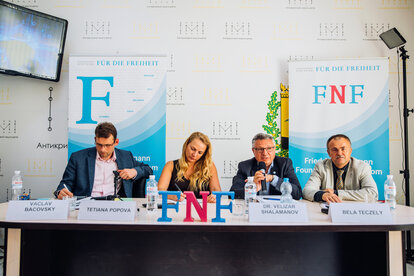Russian Military Provokation at the Border of the EU

Operation "Zapad", a big military drill run by Russia, started on 14 September at the Eastern border of the European Union in Belarus. 13 000 soldiers are reported to participate. Should such large-scale military training conducted near NATO raise fears of aggression? What is Kremlin trying to achieve with the drill?
1. Since the last large scale military trainings conducted by Russia resulted in a 5-day war in Georgia in 2008 and the annexation of Crimea in 2014, do you think this time the war games in Belarus are again a sign of their political aspirations toward this region or merely a part of their propaganda of demonstration of power with the intention to cause a hysterical reaction within NATO?
"With the Readiness Action Plan, the enhanced Forward Presence and with the great efforts of the Multinational Corps North East (MNC-NE) including six associated NATO Force Integration Units (NFIU), NATO and the neighboring countries are very well prepared to manage the situation; so for sure there will be no hysteria from NATO’s side.
In the context of hybrid and cyber scenarios provocations are not completely excluded. We might see some provocations; therefore we have to be well prepared to manage such risks. It is not by chance that Cyber Defense and Strategic Communications centers of Excellence are located in Estonia and Latvia.
We have a very clear transatlantic commitment in the region with the presence of US and Canadian forces in addition to European allies as well as brilliant cooperation with partners such as Sweden and Finland. So for Russia it is more “extending control” over own territory and draw a clear line between Russia/Belarus and NATO countries in the region."

2. From a Russian perspective NATO and Western governments have used the popular anti-Russian uprisings to their advantage, do you think that Kremlin is using this exercises to put Lukashenko under pressure and guarantee his loyalty, as well as to also discourage any oppositionists?
"Definitely. The exercises are part of the strategic communication of the Russian government on the one hand domestically for Russian target groups and on the other for Belarus and the West. It is important to interpret these messages correctly and to develop our communication lines, including the ones to Russia and Belarus. In the past, there were such approaches used by the Soviet Union in Hungary, Czechoslovakia, Poland. We will soon find out what the lessons learned by Russia finally are.
NATO and nations in the region definitely will learn a lot and hopefully by sharing with us, we in Bulgaria will better understand potential risks for our region from the military build-up of Russia. As in Belarus, we experience exercises of Serbian forces together with Russia, some of them also close to our borders and we observe with great concern the very intensive military activity of Russia in the Black Sea, next to us."
3. What are your personal expectations from the exercises? Do you think Russia will show a reformed, well-structured army?
"Yes – Russia is spending a lot of money to improve their armed forces. Now they engage also Belarus, but as in the past building effective alliances is an exhaustive exercise if not well balanced with economic development. It will be interesting to see the level of integration of forces and logistics outside the Russian territory. Observers of the exercises will be in a position to assess the real situation much better and it is important to see how Russians will manage this aspect."

4. What is the Bulgarian perspective as a NATO member country with regard to the upcoming military trainings and exercises?
"There are at least three dimensions in this area. First, we need to invest in readiness and interoperability of our forces for effective participation in large exercises and might follow the Romania example of fully synchronize national/multinational/NATO and EU exercises. Second we might consider the hosting of multinational formations, both from NATO forces and the EU, that will help to further improve the level of training. And third we might start using the exercise program to assess the opportunities for joining or even initiating multinational capability development projects both in NATO or in EU formats to accelerate the modernization of our forces at lower cost and thereby guarantee inter-operability with our allies.
All exercises are scenario based, so it is very important to have realistic scenarios developed also with contributions from Bulgaria and to maintain a regional focus in close cooperation with Romania. As a matter of fact our region of Southeast Europe is much more volatile than North East Europe – we have frozen conflicts from in Azerbaijan/Armenia, Moldova, Georgia, and Ukraine, not to mention the situation in Iraq and Syria not far to us. So we have to use exercises to raise the awareness in NATO and the EU about risks in the region and to attract a “tailored” forward presence on a rotational basis through exercises. We might also consider the deployment of permanent multinational formations as well."
Dr. Velizar Shalamanov was one of the panelists at the Future of Freedom consultation of the Friedrich Naumann Foundation, devoted to " The New Security Policy for Eastern Europe?", which took place in May in Eastern Ukraine.
Dr. Shalamanov has been leading various NGO's and was a member of Geneva Center for DCAF International Advisory Board (2002-2012), ESRIF (2007-9). Currently he is member of AFCEA Int. Executive Committee and BoDsIn the period 2009-2017 Dr. Shalamanov was director sponsor account NATO & Nations in NC3A (2009-2012) and director demand management in NCIA (2012-2017), responsible for customer relations and demand development with agreements of about 1 B Euro on annual basis. In the period August-November 2014 he was called to serve as a Minister of Defence in the care taker government of the President Plevneliev. Currently Dr. Shalamanov is Associated Professor in the Institute of Information and Comms Technologies, Bulgarian Academy of Sciences.